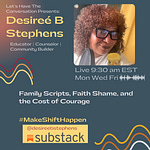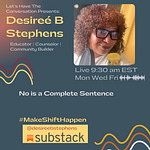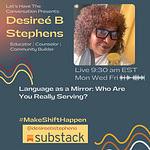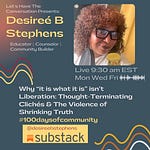The Daily Ritual of Liberation
Justice isn’t a moment—it’s a practice. Not a trending hashtag or a DEI month—it’s how we live.
Today’s conversation was about the kind of justice that shows up in how we speak to our children, how we show up at work, and how we invest in our communities. It’s about embedding justice into the daily fabric of our lives—where it belongs.
There’s this myth that justice lives in the big moments—marches, policies, headlines, hashtags.
But what I’ve found over and over again is that justice lives in the quiet.
It shows up in your kitchen.
At the dining room table.
In the pause before you react.
In the choice to reset instead of punish.
In the courage to tell the truth, even when the world is handing you a sanitized version of it.
Justice is a way of being. And when it becomes daily, intimate, and personal… it becomes powerful.
In today’s live, we unpacked exactly what that looks like. We talked about Black men, about Cory Booker, about raising our children with intentionality and shared responsibility. About why the performative versions of justice exhaust us and how to shift from symbolic to embodied, real, felt, relational justice.
This is not about grand gestures. This is about the sacred mundane. Because your two cans of soup? They matter. That conversation with your child? It matters. That check-in with your coworker? That’s justice work, too.
Free Preview
“Justice is not an event. It’s a daily practice.”
In this clip, we explore what it means to be the shift, not wait for one. Justice begins in the quiet, everyday choices we make—from how we speak truth to how we build trust.
I’m inviting you to watch this clip and ask yourself:
Where is justice trying to rise in your daily life—and are you making room for it?
3 Key Takeaways
Justice must be practiced daily.
It’s not reserved for protests or policies. It lives in how we parent, teach, show up at work, and tend to our people.Accountability sustains justice.
Not punishment—realignment. Accountability means bearing witness to harm and staying in right relationship with self and community.Justice is both personal and collective.
You’re not responsible for everything. But you are responsible for something. That “something” is your entry point to collective liberation.
Invitation to Go Deeper
This space is co-created with and by you. Paid subscribers allow me to keep showing up with resources, reflections, and truth that center justice over performative gestures.
Inside, we’re diving deep into what this looks like in your real life—with examples across self, home, and work. If you're ready to build, not just learn—this is your invitation. Come sit with us.












